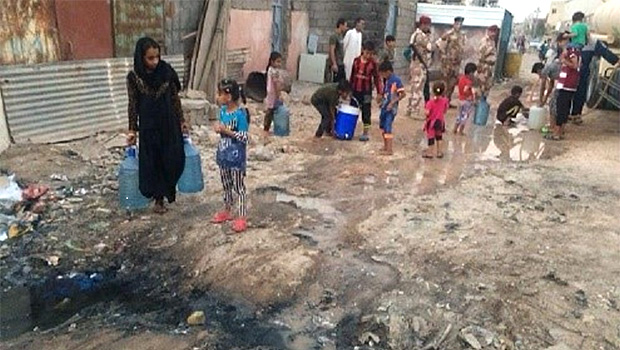A city once known as the Venice of the Arab word, riddled with fresh water rivers and date palms orchards, is currently going through a critical water shortage and pollution crisis. But this is not the only issue that locals in Basra have to deal with on a daily basis. The city is witnessing a general deterioration in public services. These accumulating problems reached their peak when residents of Basra woke up one day unable to use the water in their houses.
Over the last few weeks I have been following the worrying news from my hometown Basra. The water crisis has affected everyone, including my friends and family. Last week I was talking to my friend, Nadia, who started to get symptoms of poisoning only a few hours after brushing her teeth with the water. She told me how the pain and diarrhoea were unbearable and how her family had to rush her to the hospital at midnight. Doctors there told her that they had received 40 similar cases that same night. It felt like a plague had broken out, and my fellow Basrawis were getting worried. This outburst of public health problems was bound to happen. For decades, Iraq has struggled with degrading water infrastructure due to bad management, the aftermath of two wars and climate change induced environmental problems.
Protests
With no solution on the horizon, citizens and activists resorted to social media platforms to condemn the authorities’ neglect and to demonstrate their frustration with the ruling parties’ practices. Frustration expressed on social media developed into actual protests organised by groups of young men gathering in public places demanding the end to the Shi´a parties control – they are the ones who are responsible. The demonstrations were broadcast live by social media activists leading to more people demonstrating in front of the local government headquarters and other governmental offices. The online call for ‘#Save_Basra’ brought people to the streets, with young men and women from all kinds of backgrounds joining the protests.
Violence
The public demonstrations took a violent turn when the local government failed to meet the protesters’ demands and the numbers of patients poisoned by the polluted water soared into the thousands. The protests descended into vandalism after angry protesters besieged and burnt the local government headquarters, most of the Shi’a parties’ offices, the Iranian consulate and some officials’ houses. I was watching this with fear in my heart as some people threatened to burn the house close to my parents. The vandalism was condemned by active social media users and people were asked to postpone the protests. Activists also accused the parties of organising the vandalism themselves, alleging that infiltrators had been sent in to discredit the protestors. The government’s suppression was heavily condemned by the civil society after five people were killed and many more injured. However, the violence grabbed the attention of the central government which held emergency meetings to tackle the issue and promised to prioritise the water crisis.
Positive change
The latest unrest has shown that frustrated citizens can mobilise public opinion in their favour to create positive change. I believe this issue will take more time and debate to settle, especially if we take the country’s political conflicts into account. I believe Basra protests are the beginning of young people demonstrating against the religious authority imposed and protected by Shi’a political parties. Residents of Basra hope that the ruling parties have realised that their future in Basra is at stake if they continue to overlook people’s’ demands for a better life.
More information about Shatt al Arab
Shatt al Arab is the main river in Basra province. It runs through the city from north to the south and ends in the Persian Gulf. Basra depends on Shatt al Arab for irrigation, industries and daily consumption. The pollution of the river has been the focus of many researchers, including Dr. al Hassan, a local environmental expert. Al Hassan was interviewed by a well-known television broadcaster about the consequences of chemical and biological pollution in the river on people and the environment in general. He mentioned that the salt concentration had exceeded the recommended levels by 2,000% and that the water is a cocktail of chemical and biological pollutants. Residents of Basra agree that the water in Shatt al Arab is no longer usable and requires both immediate and long-term solutions. Meanwhile, locals continue buying bottled water to avoid being poisoned.
Maha Yassin is a MA student from Basra, Iraq at the Erasmus University and volunteered for PAX.




